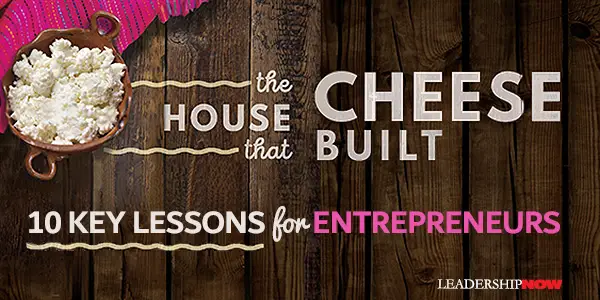 |
 |
09.11.23

10 Key Lessons for Entrepreneurs from the House that Cheese Built
IT ALL STARTED with cheese. Miguel Leal didn’t start out wanting to make cheese. He was just looking for a “job that would help me survive the disaster of my father’s death and the mess I’d made of my own education and life so far.” Cheese found him. Learning all he could from the cheese manufacturers he worked for in both Mexico and the United States, he eventually started Mexican Cheese Producers with his partner David Webster. They built into a multi-million dollar company before selling it to Sigma Alimentos. Lean shares the ups and downs of his journey in The House that Cheese Built. It is a heartfelt, interesting story. From his experience, he pulled together ten key lessons for entrepreneurs: 1. Hard Times Can Be Your Best Teachers. “Because I had no means of support other than my own wits, I became adept at watching other people and learning through observation and experience. Desperate to better myself, I applied a laser-like focus to every task in front of me, learning what I needed to know.” 2. Be Your Own Best Customer and Make Something People Want. “Think about what you want that isn’t already out there. Focusing on the marketplace and testing what your customers want is a much surer strategy for growth than trying to outsmart your competitors.” 3. Take Satisfaction in Achieving Small Steps Toward Your Goal. “Thinking too far in advance can cause you to stumble and give up because it makes your goals seem impossible to reach. Instead, set small, incremental goals that are realistic to achieve. You’ll make steady progress that way.” 4. Get Your Emotions Under Control Before Making Important Decisions. “In the business arena, just like in every other part of your life, certain events will spark strong emotions … and you find yourself obsessing over what happened. Your vision tunnels, and you can scarcely breathe because tension is like a lasso around your ribs. But no good business decision can be made in that kind of emotional state. Pause and take a breath. When you’re calm, consider your options, actions, and potential consequences. The act.” 5. Everything in Life Happens for a Reason—Even Obstacles. It’s easy to say, “I can’t do it,” when we hit a roadblock. “Instead of letting myself quit, I persisted, tackling one roadblock at a time and viewing each obstacle as a new learning opportunity. Practice saying yes to new opportunities whenever you confront a roadblock. Sometimes, if it’s hard to jump over an obstacle, people make the mistake of not moving because they’re afraid of falling down. But if you want to succeed in business, you must keep finding new ways to push through obstacles, hurdle over them, or go around them one step at a time until you reach your desired destination.” 6. Let Failure Inspire You. “Take joy in learning from your mistakes and let failure inspire you. Otherwise, life will surely keep hitting you in the same spot. Each problem you resolve is a learning experience.” 7. The Rhythms of Life Will Change as You Succeed, but Stay Alert. “Imagine your business as a tiny snowball and you’re pushing it up a mountain. The higher you get on the mountain, the more snow you gather (and maybe some rocks, too). As the snowball gets bigger and bigger, it will take more effort to keep pushing it up the mountain. Finally, you reach the summit, and suddenly your journey is a downhill one. However, even though your effort will change—you will no longer be pushing that snowball to maintain momentum—you can’t take your eye off the snowball.” 8. Happiness and Success Are Never Permanent and Are Not Tied to Wealth or Ambition. “Happiness and success are intangible things. Only you can define what they mean to you, and those definitions will likely shift over time. A fulfilling career is never about the money, in the end, but about realizing your true passions. The same is true of relationships.” 9. To Succeed in Business, You Need to Persuade Others to Take a Risk on You. “Develop a strong, consistent personal brand that evokes confidence in everyone around you, especially financial partners. This means demonstrating consistent reliability in your ethics and consistency in how you show up.” 10. Develop an Exit Strategy. “Your exit strategy should be based on examining your own physical and mental health, whether you’re in a position to build a legacy company for future generations, and evaluating whether you have money enough to live according to your own needs and values—not some arbitrary dollar amount.” 
Posted by Michael McKinney at 11:39 AM
|
BUILD YOUR KNOWLEDGE


How to Do Your Start-Up Right STRAIGHT TALK FOR START-UPS 
Grow Your Leadership Skills NEW AND UPCOMING LEADERSHIP BOOKS 
Leadership Minute BITE-SIZE CONCEPTS YOU CAN CHEW ON 
Classic Leadership Books BOOKS TO READ BEFORE YOU LEAD |